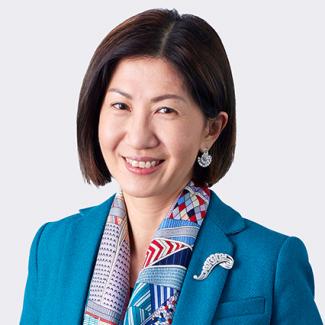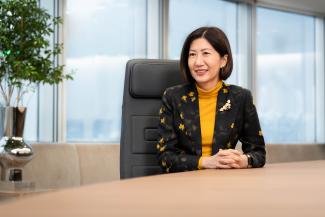A conversation with Bonnie Chan, CEO of HKEX

Before leading Hong Kong Exchanges and Clearing Limited (HKEX), Bonnie Chan spent nine years as a Davis Polk partner in Hong Kong spearheading the office’s growth and shaping how the firm’s lawyers in the region are trained. Read on for Bonnie’s reflections from her varied career, her thoughts on the flow of capital in China, and the habits that keep her operating at peak performance.
You’ve had a varied and fascinating career path: law firm associate, investment banker, then in-house counsel at a securities firm, then HKEX, then nine years as a Davis Polk partner before returning to the HKEX. Looking back, which of these transitions seem most pivotal?
There were actually two pivotal transitions in my career. The first was when I first left the legal profession and moved to investment banking. I had trained as a lawyer and assumed that would be my lifelong career. But then the opportunity to take on the challenge of being a banker came along and I let my curiosity lead me. Looking back, I didn’t really know what I had signed up for. I was curious about the lifestyle and nature of the job, traveling around the region and doing deals – all of that appealed to me. It was an important point in my life because it stretched me in a way that I hadn’t imagined would be in the cards when I started my career as a lawyer. I got to learn about how things are done in an investment bank, which became extremely helpful because it gave me a well-rounded understanding of the financial services sector and capital markets. This continued to help me in the latter part of my career as a partner at Davis Polk serving investment banking clients and as a regulator.
The second pivotal transition was when I joined HKEX to become a regulator in 2007. This was something very new to me because for the first time in my career I didn’t have a ‘client.’ In many ways, having a client makes life simple. As a regulator, for example, if you want to write a new listing chapter, say allowing mining companies to get listed in Hong Kong, how should you set the eligibility requirements? There are many stakeholders. And if you ask 100 stakeholders, you’ll get 100 different answers. What I learned most during this transition was the ability to take a more comprehensive view of issues, be conscious of conflicting interests and balance them to solve problems in collaboration with a wider range of stakeholders.
What drew you to Davis Polk and back to law firm work in 2010?
Bill Barron, who was the head of Davis Polk’s Hong Kong office at that time, approached me to discuss expanding into Hong Kong law. Eventually, his requests for advice evolved into an invitation to join the firm as partner. I think most people who go to law school harbor, at some point, the dream of becoming a partner at a respected firm. So, I was very flattered to be offered partnership at Davis Polk, a highly respected name in the legal community. I also thought at the time, after being HKEX’s Head of IPO Transactions for three years, it would be nice to return to the front lines and understand the latest market developments and trends.
You played an integral role in the growth of our Hong Kong office. Can you tell us more about that?
It was fascinating. I joined the firm to establish its Hong Kong law practice – I had never done anything like that before. I recruited what was essentially the practice’s founding team and helped design our trainee program. That was a lot of fun. My proudest moment was nine years later when I left and felt I could pass the torch to the next generation, many of whom were trained in-house, from associates all the way up to partners.
Do you have a favorite memory of your time at Davis Polk?
In Hong Kong we have a trainee system through which law graduates complete two years as a trainee solicitor before being admitted as full-fledged lawyers. When we were designing Davis Polk’s trainee program, Paul Chow, who was a partner at the time (and is currently HKEX’s Group General Counsel) proposed that trainees follow an apprenticeship model and sit with their supervising partner in the same room. You can imagine that there would naturally be some awkwardness at first and it would take some getting used to, but I actually think this was a great learning experience for all. During my time at Davis Polk, around 10 trainees sat next to me, observing my work (and occasionally overhearing my personal calls). I got to learn more about the younger generation’s take on things and become even more connected to the office, while the trainees also learned what it was like to be at a senior level. It dawned on me that a lot of the training I’ve had in my own career has really been about exposure to more experienced people and observing how they do things. I think that experience sparked my passion for developing talent. It’s a very rewarding feeling when you take good care of a business, groom the next generation and, when it’s time to move on, you can pass it on knowing that it’ll be in good hands.

Although you have spent a majority of your career working in Hong Kong, you did also work in New York – were those experiences to be different in terms of legal work?
I was much younger when I was a lawyer in New York. I would say that my time in New York really gave me the experience of working within a very established legal framework for businesses and companies. When I moved back to Hong Kong in the mid- 90s, Hong Kong’s lawyers were just starting to do a lot more work in mainland China. Back then, the legal frameworks of the mainland were quite nascent, so we had the liberty to be more creative in negotiating with clients. So, it was great to have the experience with New York’s highly-established system, and then be able to adapt and apply that when I returned to an environment in Asia that was still taking shape.
You are the first internally promoted CEO of HKEX. What do you see as the biggest challenges and opportunities facing the Exchange? What do you most hope to achieve as CEO?
It means a lot to me that I am the first internally promoted CEO, and I’m quite proud of the fact that at HKEX talent can grow and rise all the way to the top job
In the face of changing world orders, we do have challenges. We work in a very d namic environment, surrounded by geopolitical and technological changes, and the way capital is formed is very different now than in years past. Nowadays, people have many avenues through which they can invest, so we constantly strive to stay relevant and competitive. We also have many more competitors. But I personally believe that there are a lot of opportunities in front of us because of our unique role in connecting capital between mainland China and the world. The rest of the world is still very much underinvested in mainland China, and mainland China is still very much underinvested in the rest of the world. There is huge potential for two-way flows and Hong Kong is best positioned to facilitate that growth.
What sort of mantra drives you in your career?
I think the key mindset that I live by is to be curious about everything. It’s a mindset that has helped me over the years. If not for curiosity, I would not have left the legal profession to become a banker, and again to be a regulator. I wouldn’t have built up a legal practice in Hong Kong. Everything ties back to me being curious and hungry for new experiences. And now, I know what it’s like to be a CEO! So, curiosity has definitely served me well.

We understand you have a very robust exercise routine. Take us through a day in the life of HKEX’s CEO.
As a CEO, I need to have a very disciplined routine because consistency drives results. I take inspiration from athletes who are known to follow very strict regimens.
My typical day starts at 4:45 a.m., and I go to the gym to do my morning workout, which consists mostly of weightlifting. Then, I’m in the office around 6:30 a.m., and I break my day down into 10 to 15 tasks, which could include meetings, interviews and other engagements. I try to finish work at 7:00 p.m. and cook dinner at home for my husband and me, then I conclude my day with an hour on the exercise bike. I use this time to reflect on the day and think about the next one. Then I go to bed and the routine repeats.